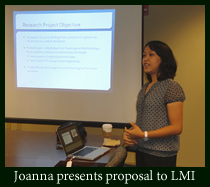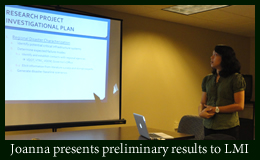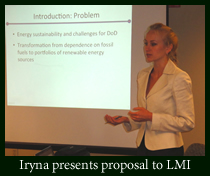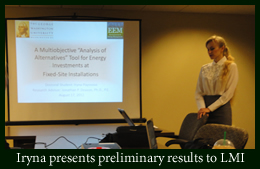In the Summer of 2012, the EMSE Department was awarded two research grants from the Logistics Management Institute (LMI) for research on issues important to LMI’s mission. Doctoral candidate Iryna Payosova (advised by Professor Jonathan Deason) is undertaking research on "A Multiobjective 'Analysis of Alternatives' Tool for Energy Investments at Fixed-Site Installations" and Doctoral candidate Joanna Resurreccion (advised by Assistant Professor Joost Santos) is undertaking research on "Resilience Enhancement Planning for Interdependent Critical Infrastructure Systems."
Joanna Resurreccion

In her research, Joanna is leveraging the preliminary results from her recent publication in Risk Analysis, “A Multiobjective Prioritization Methodology and Decision Support System for Evaluating Inventory Enhancement Strategies for Disrupted Interdependent Sectors.” She is seeking to expand her previous formulation of economic resilience to accommodate resilience enhancement planning for interdependent economic and infrastructure systems. A decision support tool is being developed and demonstrated to prioritize critical systems associated with different hurricane scenarios in Virginia.
In her research efforts, Joanna is identifying a list of critical infrastructure systems (transportation, electric power, telecommunications, and water distribution) and assessing their relative worth to the functions of the economic and service sectors in Virginia. She will be collecting data from the Bureau of Economic Analysis, US Census Bureau, and other sources to build industry-by-industry transactions database, and collecting information on the levels of services and inventory of goods for the economic and infrastructure systems using the North American Industry Classification System.

These data will enable her to determine associated initial inoperability levels for each economic and infrastructure sector and identify and classify resilience enhancement opportunities.
Iryna Payosova

In her research, Iryna is helping the Department of the Army optimize its return on energy investments at fixed-site installations. In doing so, she is investigating two approaches to defining energy related investment opportunities a programmatic approach and a project-specific approach. She also is utilizing an a priori MCDA formulation to identify optimal portfolios using SME-generated weights, and an a posteriori preference elicitation process that can be used to identify Pareto optimal energy investment portfolios without the need for assessment of a group utility function.
Such a Pareto optimal subset of feasible alternative investment portfolios will be followed by exposure of decision-makers to a display of outputs from the Pareto optimal portfolios. Under such an approach, decision-makers would not be required to assign criteria weights but instead would operate directly in the “decision space” to identify preferred portfolios. Such an approach could reduce the complexity of the budget allocation problem and forgo the need for decision-makers to assign criteria weights in isolation.
Preliminary results of the pilot level trials undertaken indicate that the Net Zero Energy optimization tool being developed in Iryna’s research can provide policy-relevant information to federal agencies in a more useful manner than reliance on the extremely large and noncomparable data set available from current energy efficiency, renewable energy and greenhouse gas reduction reporting requirements.



